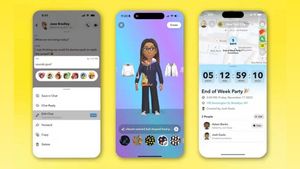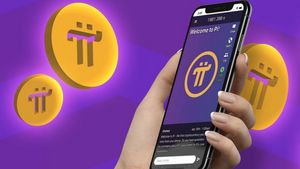JAKARTA - Developers of the 'AI Death Calculator' who claim to be able to predict when a person will die with an accuracy of 78 percent, have issued a public warning about the new threat.
Researchers at the Technical University of Denmark have found that imitating apps have flooded the market since they revealed their technology, called life2vec, last year. But the team noted that their AI will not be made publicly available online.
The team revealed the whereabouts of four AI 'death counterfeiters' promoting 'false services': AI Doom Calculator, Intelligent Death AI, Death Predictor, and Telecharger with ambiguous names.
The imitators ask users to provide details of credit cards, emails, and other sensitive information that allows malicious actors to steal money and identity.
The scientist behind the algorithm that could predict when someone would die now warns that a 'fake service' is developing on the internet and stealing victims' personal data.
"We are aware of social media accounts and at least one fraudulent website claiming to be linked to the life2vec model," the researchers warned internet users curious about deaths through their official AI homepage.
"We are not affiliated with these entities or other entities claiming to use our technology," they added.
The Life2vec team, which first revealed the power of their AI in December last year in the journal Nature Computational Science, hopes that the public will 'be careful' malicious copy fraudsters who 'have nothing to do with us and our work.'
Despite public pressure to test their own future with life2vec predictions, researchers must keep AI operational under confidentiality to protect personal information from people whose data is used to train the system.
This is because more than six million real personal information, including income, profession, residence, injury, and pregnancy history, were included in the algorithm, as key researcher Sune Lehmann explained to DailyMail.com.
Therefore, Lehmann said, Life2vec is not available to the public or companies to use.
We are actively looking for ways to share some of the results more openly, but this requires further research to be done in a way that can guarantee the privacy of the people in this study, said Lehmann, professor of networks and complex systems.
Even when the model is finally publicly available, the Danish privacy law will make the use of life2vecs to make decisions about individuals such as writing insurance policies or making recruitment decisions illegal.
This'model' opens up an important positive and negative perspective to be discussed and handled politically,' as Lehmann told Newswise.
Similar technology to predict events of human life and behavior has been used today within technology companies that, for example, track our behavior on social networks, make our profile very accurate, and use those profiles to predict our behavior and influence us, added Lehmann.
"This discussion needs to be part of a democratic conversation so that we consider where technology takes us and whether this is the development we want," he explained.
The potential for corporat abuse or the government is a special concern for researchers behind live2vec, due to the accuracy of their above-average systems. The model, trained with data from 2008 to 2016, is shown to be able to correctly predict who died in 2020 more than three-quarters of the time.
SEE ALSO:
This AI does this by analyzing the story of the user's life - the stimuli of their text.
Lehmann and his team provide different tokens for each information, and all these pieces of data are mapped out for each other.
The categories in the story of people's lives include the whole range of human experience: broken arms represented as S52; working in a tobacco store coded as IND4726, income represented by 100 different digital tokens; and 'postpartum blood' represented as O72.
Many of these relationships are intuitive, such as professions and income - some work making more money.
But what life2vec does is map out the big constellations of factors that shape individual lives, allowing one to ask for AI to make predictions based on millions of other people and many factors. It can also make predictions about one's personality.
The test asks respondents to assess 10 items based on how well they agree, such as The first thing I always do in a new place is get acquainted with friends,'' or I rarely express my opinion in group meetings.
It's important to note, said Lehmann, that the data all comes from Denmark, so this prediction may not apply to people living elsewhere - apart from the fact that most people may not actually want to know when they will die.
The English, Chinese, Japanese, Arabic, and French versions are automatically generated by the AI. So there may still be inaccuracies in translating, please always see Indonesian as our main language. (system supported by DigitalSiber.id)


















